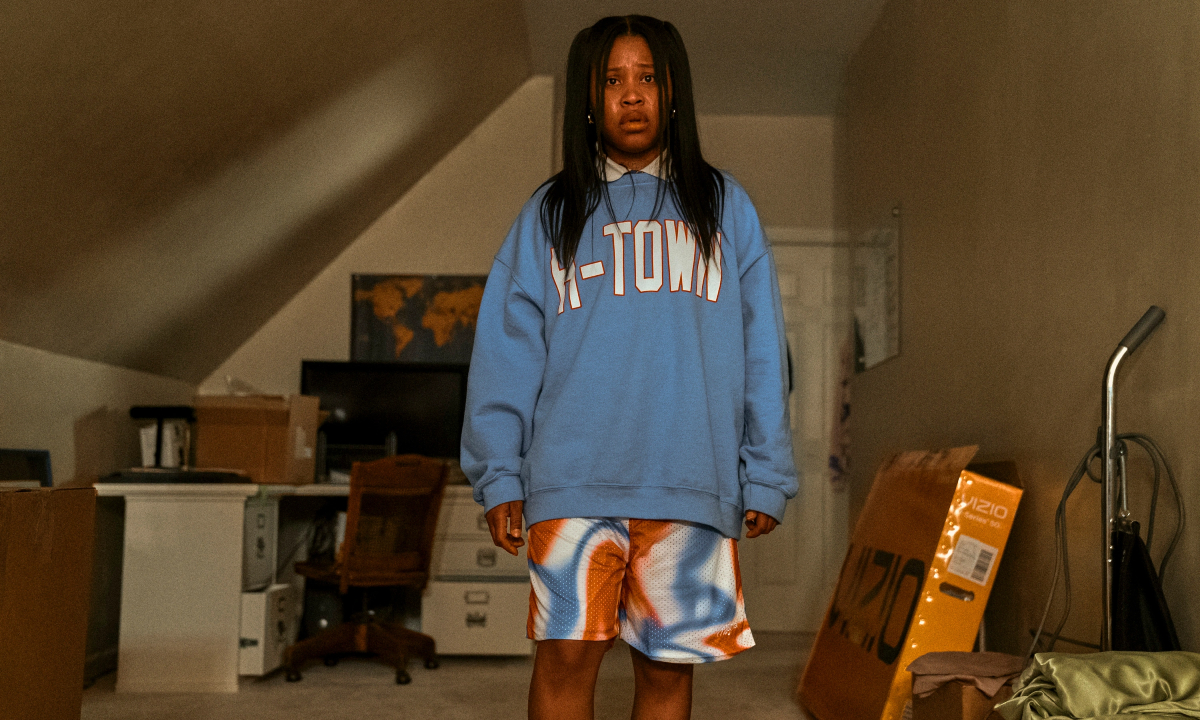How ‘Swarm’ Turns True Stories Into Terrifying Stan-Fiction
Don't poke the hive...

Following the success of Atlanta, which impressed audiences and critics alike, Donald Glover has returned with another surreal, satirical, genre-bending original series: Swarm. Co-created by Janine Nabers, the Prime Video original series tells the story of Dre (Dominique Fishback), an obsessed fan who goes to violent lengths to defend the honor of her favorite pop star—fictional superstar Ni’Jah. While no real-life celebrities are mentioned by name, many fans have been quick note comparisons between the plot of Swarm and real-life incidents involving Stan Twitter’s favorite celebrity, Beyoncé, which raises the question:
Is Swarm based on a true story?
Yes and no. Every episode of Swarm starts with a title card letting the audience know that this is not a work of fiction and that any similarities to real-life people and events are purely intentional—a subversion of the classic disclaimer that typically accompanies stories inspired by true events. The title card is more of a tongue-in-cheek nod to the audience as opposed to a declaration that it should be taken seriously, but it’s a good indicator of Swarm’s attitude toward depicting true events: though the names may have been changed, it pulls heavily from a number of headlines.
From the marketing to the music to the title itself, Swarm deliberately invokes the imagery and iconography of Beyoncé’s fanbase: the Beyhive. The conceit of the series is to fictionalize and satirize the length that fans on Twitter (known colloquially as “stans”) will go to in defense of their favorite celebrities—using the famously devout passion of the Beyhive as a framework. In that regard, Swarm is sort of based on a true story. It’s heavily inspired by Beyoncé and her fans, and also lifts a number of plot points directly from bizarre public incidents related to Beyoncé.
Most notably, one of the major turning points in the show is when Dre finally gets the chance to meet Ni’Jah in person, but panics and ends up biting her at a party before fleeing the scene. This is, of course, a play on the sensationalized “who bit Beyoncé?” mystery that made the rounds a few years ago. The biting storyline is similar to a number of other Swarm storylines that pull from real life: Ni’Jah plays Bonnaroo, Beyoncé played Coachella. Ni’Jah embarked on a “Running Scared II Tour”, while Beyoncé had her “On the Run II” tour.
Even Ni’Jah’s album marketing is reminiscent of Beyoncé. In addition to an abundance of visual references, Swarm’s series premiere “Stung” reveals that Ni’Jah has released a surprise visual album called Festival, the same release strategy that Beyoncé famously employed when she dropped Lemonade out of the blue. Then, of course, there’s the Swarm itself: Ni’Jah’s fans call themselves the killer swarm, while Beyoncé’s fans are, of course, the Beyhive (buzz buzz).
Is Marissa Jackson based on real person?

While there was never (to our knowledge) a die-hard Beyoncé fan who went around killing people who tweeted slanderous things about her, the series does lift plenty of elements (both aesthetic and narrative) from the real-life exploits of Beyoncé and her Beyhive. While Dre’s murderous exploits aren’t based in truth, there is a somber plotline that Swarm lifted from another Beyoncé-related news story: Marissa’s death in the series premiere.
In the show, Dre’s closest confidant is her sister Marissa (Chloe Bailey), who dies at the end of the first episode. After spending the night out at a club and going home with a hook-up (Rory Culkin), Dre checks her phone and discovers a series of increasingly frantic messages from Marissa. Her boyfriend, Khalid, cheated on her, and Marissa identifies painfully with Ni’Jah’s Festival—like Lemonade, the Ni’Jah album is about her husband’s infidelity. Dre rushes home to find Marissa, who has a history of self-harm, dead; it’s implied that she took her own life while listening to Festival.
This part of the series is a nod to a real-life news story that went viral a few years ago. In an interview with Shondaland, Swarm co-creator and writer Janine Nabers revealed that Marissa’s death and name were references to a rumor that circulated around the time Beyoncé released Lemonade:
“In April of 2016, Lemonade was released. On the same night, there was a rumor about a woman named Marissa Jackson who committed suicide after watching this visual album because it basically confirmed that a very powerful man was cheating on one of the most incredibly beautiful and successful pop stars of our time. I’m from Houston, Texas, and my very best friend’s last name is Jackson. There was a lot of texting between Houstonians being like, ‘Yo, who is this Marissa Jackson? Is this a true story?'”
The rumor is said to have originated with a now-defunct hoax/satire site called the Empire Herald, and while the article in question appears to have been scrubbed from the internet, Snopes has an archive of some of the publication’s fake stories.
More Beyoncé references in Swarm
Another nod to reality in Swarm: Beyoncé stand-in Ni’Jah has a famous sister named Caché, a reference to Solange Knowles. The Solange connection doesn’t end with Ni’Jah having a sister, though. One of Dre’s targets is a right-wing conservative type who she sets her sights on when she drags Caché on Twitter for getting into a very public argument in an elevator. This echoes the actual infamous dust-up between Solange and Jay-Z in the elevator of a New York hotel—an altercation which was caught on camera and that the show faithfully recreates shot-for-shot.
Then, of course, there’s the show’s finale, which features Dre (who’s changed her name to Tony while living in hiding) finally getting her wish and seeing Ni’Jah in concert. Overcome with emotion, Dre tries to jump onstage and give her idol a hug, and our homicidal protagonist ends the series with a possible dream sequence that sees her becoming friends with Ni’Jah. Though reality diverges when it comes to Dre’s seemingly happy ending, Swarm‘s finale yet again takes inspiration from real life: Dre’s stage-crash is a nod to when a fan rushed the stage during Beyoncé and Jay-Z’s On the Run II tour.
Ripped from the headlines
The real-life connections in Swarm don’t stop with Beyoncé, though—the series also lifts a number of bizzare plot points from unlikely incidents that happened in real life, albeit ones that aren’t related to Bey. Episode 2, “Honey”, features Dre briefly becoming a stripper. On the way home from a house party with a few of the other dancers, their car breaks down and the man who helps them fix their tire is one of the Ni’Jah haters Dre’s been stalking on Twitter. When they head back to his place to fix their car, Dre attacks him.
Unfortunately for Dre, she underestimates the man’s strength and he gains the upper hand. Thinking she’s being assaulted, the other dancers attack and kill him while Dre flees the scene, leaving them to deal with the dead body. Though the events leading up to the killing may be different, the story of four exotic dancers shooting and killing a man is another beat Swarm lifts directly from the news cycle. Back in 2017, four strippers were arrested for killing a man after he helped them fix their spare tire.

Later in the series, Dre crosses paths with Eva (Billie Eilish), a charismatic cult leader. Though seemingly welcoming at first, it turns out that Eva has sinister intentions and blackmails Dre with the confession of her crimes. Eva’s cult, “DecaWin,” was inspired by the actual cult NXIVM, and the shoulder scars that her followers have carved into their skin are similar to those found on members of NXIVM’s subgroup, DOS. The strategy of blackmailing Dre with “collateral” (i.e., the knowledge of her crimes) if she leaves their group was a similar tactic employed by NXIVM to keep members from leaving.
Combining the fanatical obsessions of stan twitter with surrealist high-brow horror, Swarm‘s seven-episode run is already being hailed as one of 2023’s most complex and well-written shows. Like its subject matter, however, it’s not without its own controversies. Regardless of your attitude toward the show’s use of real-life events to tell a sensationalized fictional story, the attention to detail in Swarm is an impressive effort that will undoubtedly take multiple rewatches before every last reference and Easter egg can be found.
(featured image: Amazon Prime Video)
Have a tip we should know? [email protected]